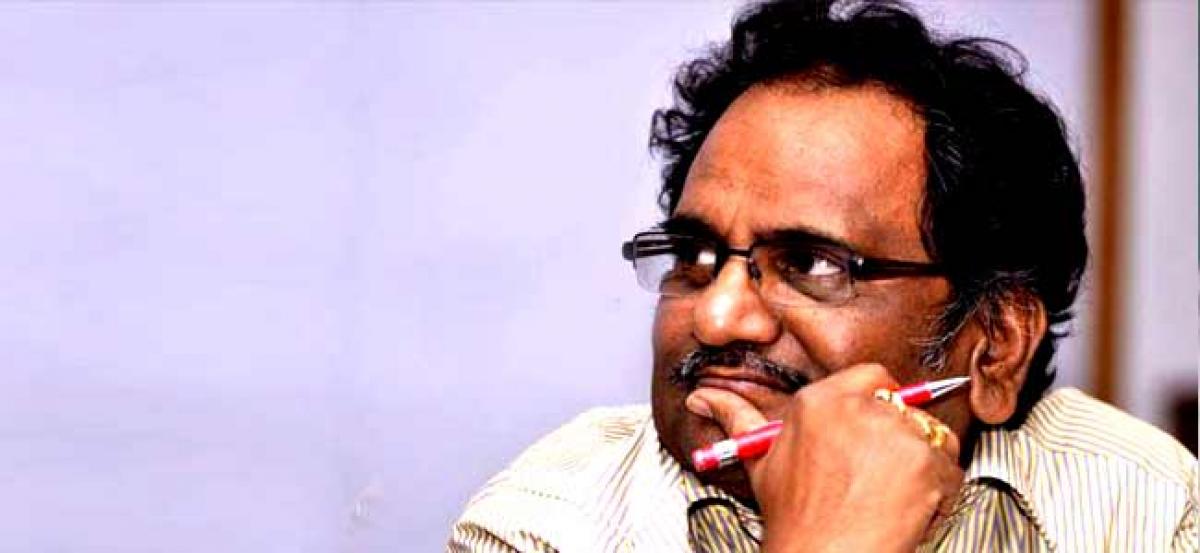Live
- How Individuals Can Contribute to Environmental Conservation Efforts and Make a Difference
- Smart Logistics: Leveraging AI for Real-Time Decision Making and Route Optimization
- ‘Bachhala Malli’ set for Dec 20 release
- ‘Devaki Nandana Vasudeva’ creates buzz
- My role in ‘Mechanic Rocky’ will be very unique: Shraddha Srinath
- Bhagyashi Borse comes onboard for ‘RAPO22’
- BGT 2024-25: Yash Dayal added to Indian team’s pace bowling reserve list after Khaleel Ahmed gets injured
- Centre urges southern states to fast-track schemes to boost farm sector
- Karnataka government will promote more industries: DCM DK Shivakumar
- Naxal menace has come to stay
Just In
Fake news is a criminal activity and punishable: CIC Commissioner


Prof. Madabushi Sridhar Acharyulu, Commissioner, Central Information Commission, New Delhi, observed that despite corporatization of the media and credibility deficit, there is still private space for the citizens and journalists to exercise their democratic rights.
Hyderabad : Prof. Madabushi Sridhar Acharyulu, Commissioner, Central Information Commission, New Delhi, observed that despite corporatization of the media and credibility deficit, there is still private space for the citizens and journalists to exercise their democratic rights.
Delivering the key note address at the symposium on” Ethics of Electronic media,” here today at the Department of Journalism and Mass Communication, Prof. Sridhar Acharyulu said that there is private space for issues of public concern provided journalists use their editorial judgment and are not swayed by what is trending in social media
On corruption in media and fake news, Prof. Sridhar, remarked that fake news is a criminal activity and is punishable. “Desist from indulging in such acts, he urged journalists. Lamenting that “strong editors” are a vanishing breed, he said a few such individuals are bound to become “former editors” very soon. Pointing out that the media has been corporatized, he said one cannot discuss ethics without talking of media take over by corporate and commercial interests. In fact the First Press Commission recommended delinking the industry from the media but today there is total silence on the issue. Also, there should be curbs on cross media ownership, he added
Freedom of speech and expression and the media are coming under serious threat from commercial and other interests and is being suppressed for losing credibility, the Information Commissioner , he said and added that electronic media has become “ entertainment media” he called upon journalists that individual ethical framework coupled with spirited public interest journalism is the need of the hour.
Citing examples from the Vietnam War he pointed out that one journalist through his Pulitzer winning picture of a girl in a warn torn country changed public opinion leading to stoppage of war. He said, another journalist committed suicide for not helping a toddler in a famine stricken country with a vulture waiting to devour it. These are shining examples of what individual journalists can do to mould public opinion, he added. Civil society is the fifth estate and as citizens we need to educate others.
Recalling the efforts of a Professor from Ahmadabad who approached the court seeking information about the criminal antecedents of politicians, he said, all political parties opposed it. But the Court saw nothing wrong in the petition and directed the Government to act. His persistence paid off and the Representation of People Act was amended and today we have all the data of our people’s representatives in public domain.
Guest of honour, Prof. K. Nageshwar pointed out the dependency of media on the market forces and said that perspective is being lost in the din during prime time. What is in public interest need not necessarily be of interest to public, he said and regretted the degradation of values in the society which impacts media.
Prof. K.Stevenson, Head, Journalism Department presided. Silveri Srishailam, Editor- Probetimes, Uppala Laxman, Ex Member, PCI, Subash Agarwal, RTI activist also spoke. The symposium was organized by the Department of Journalism and Mass Communication in collaboration with Telangana Journalists Association. Several working journlaists, research scholars and students participated.

© 2024 Hyderabad Media House Limited/The Hans India. All rights reserved. Powered by hocalwire.com






